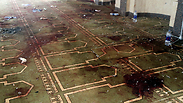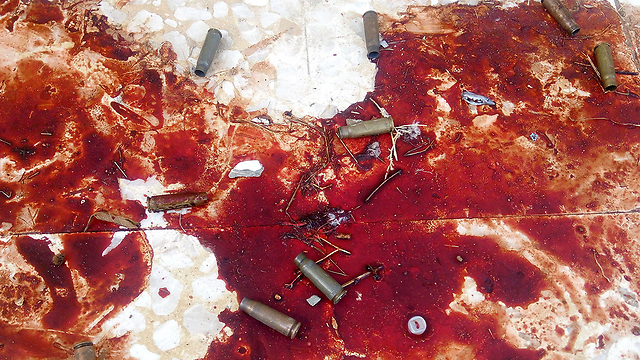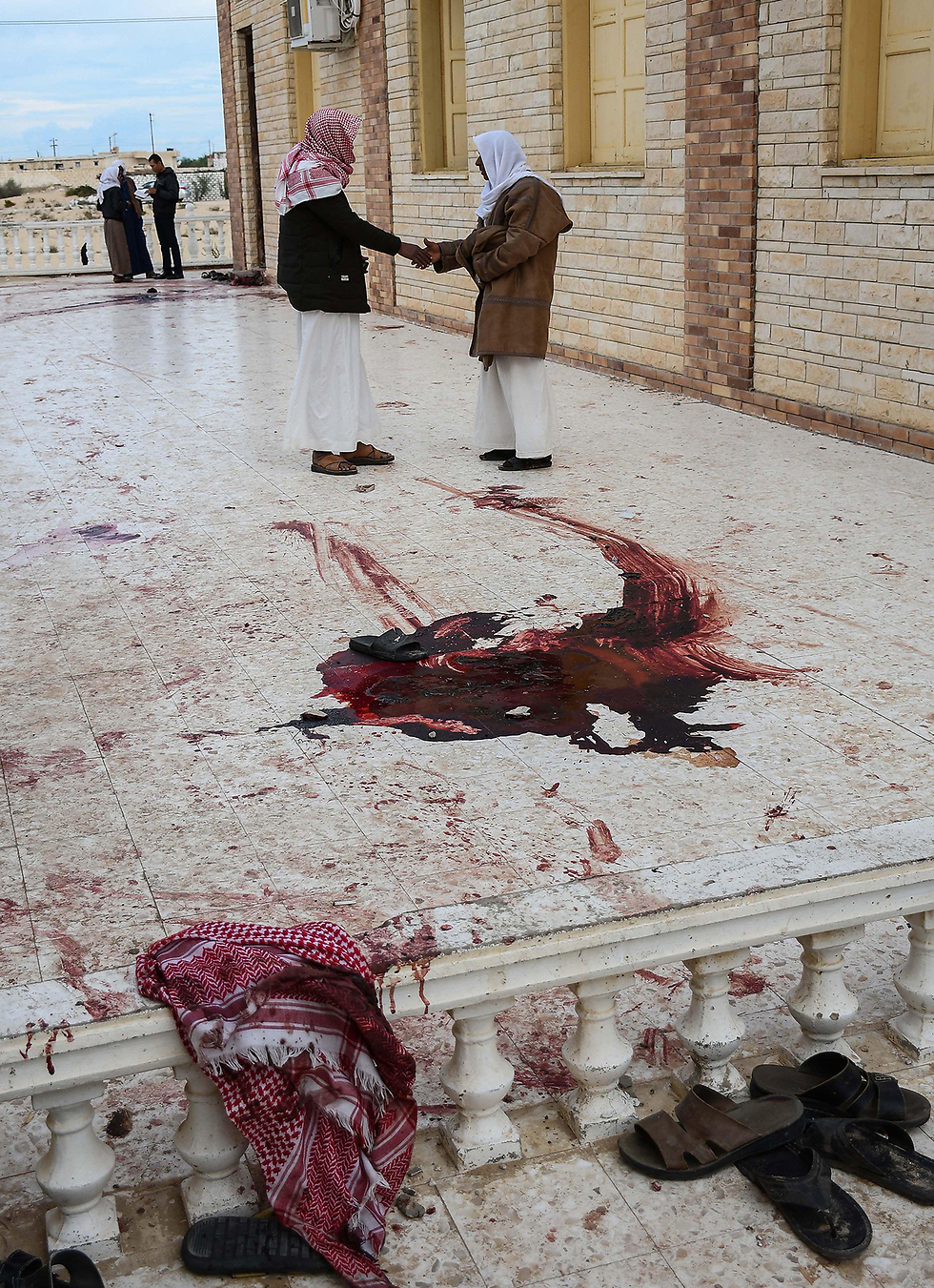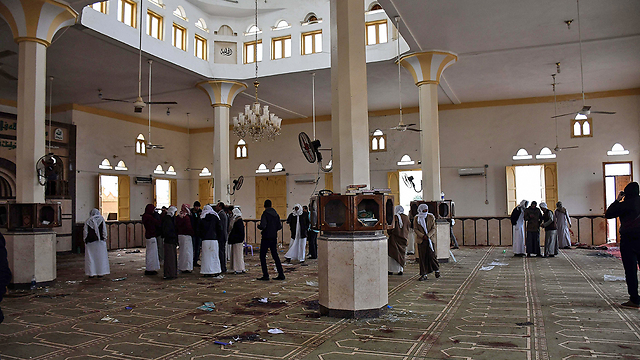
Friday's massacre at a Sinai mosque
צילום: רויטרס
Islamic State’s war of survival against a helpless Egyptian army
Analysis: After losing its territorial strongholds in Syria and Iraq, ISIS feels it must prove that it still exists as an idea and as an armed force across the universe, and the Sinai massacre serves its strategic goals. The Egyptian army, with its unsuitable fighting methods and lack of accurate intelligence, has yet to learn how to deal with the murderous organization.
The murderous terror attack in northern Sinai, which left more than 300 people dead and some 130 wounded, was likely carried out by the Islamic State organization.
While the ISIS branch in Sinai, an organization called Ansar Bait al-Maqdis, has yet to claim responsibility for the attack, all signs indicate that it was carried out by an organization affiliated with the global Islamic Jihad and ISIS. This is an important point, as one of the main reasons for the attack on the mosque in the town of Bir al-Abed was religious-theological.
The Bedouins and Egyptians who used to pray in this particular mosque belong to Sufism, a mystical trend in Islam characterized by a messianic interpretation of the Quran and the oral traditions of Islam, the hadith, based on a search for social justice.
The Salafi movement, which ISIS is affiliated with, argues that all other trends, which don’t follow the Quran word for word and as it was interpreted by Prophet Muhammad and his colleagues, are mainly heretics. The Salafists can be seen as orthodox while the Sufis are sort of reformists who support a mostly non-violent Islam.
But the main reason for the murderous attack was that the ISIS branch in Sinai (“Wilayat Sinaa”) wants to demonstrate that despite the Egyptian security forces’ enhanced offensive, it is alive and even kicking. It is very important for ISIS to prove that despite losing its territorial strongholds and the sources of its financial wealth in Syria and in Iraq, it continues to exist as an idea and as an armed force scattered across the universe—starting from Boko Harm, which is active in Africa, to Abu Sayyaf in the Philippines, not to mention the lone-wolf terrorists who are active in Europe and North America, inspired by the ISIS messages spread on the internet.
The reason it is so important for ISIS members in Sinai to prove that they are alive and active, despite the Egyptian army’s attacks on them, is part of their attempt to shake off the curse that struck the organization in Syria and in Iraq.
Unlike Syria and Iraq, where there are active forces against ISIS which have good intelligence, as well as armies with a lot of experience in asymmetric fighting against guerilla organizations and terrorists, the Egyptian army has failed in dealing with the ISIS challenge—despite the intelligence and perhaps even operational help it is receiving from the IDF, according to foreign sources.
The Egyptian army has been unsuccessful in enlisting local armed forces of the Bedouins in Sinai to fight ISIS like the Americans, the Iraqis, the Syrians and the Russians have done against ISIS in Syria and Iraq. In Sinai, there are no Shiite collaborators to fight Sunni ISIS. Meanwhile, the Egyptians have managed to convince some tribes in northern Sinai not to cooperate with ISIS, mainly through economic temptations and promises to improve the employment situation in Sinai.
The Egyptian neglect of Sinai and the discrimination against its residents, as well as the Egyptians’ arrogance and spurn towards the Bedouins, was the main reason for the Bedouin tribes’ support for ISIS. The older generation was not as keen on the Islamist organization as the younger generation, but the economic situation and the fact that the smuggling of drugs and foreign workers through Sinai had been blocked prompted them to cooperate with the terror organization. The Egyptians understood the situation, and in the past year they have managed to convince some tribe leaders not to cooperate with ISIS.
Most residents of Bir al-Abed belong to a tribe called Sawarka. Its members, who reside in northern Sinai in the El Arish-Rafah area, near the Egypt-Israel border, decided recently not cooperate with ISIS in return for economic benefits they had been promised by the Egyptian government. According to unverified reports, the members of this tribe—which has representatives in Israel too—refused to provide shelter to some ISIS members fleeing the Egyptian security forces, thereby giving ISIS a reason for revenge. That was the third reason for the attack on the local mosque.
Friday’s attack has another aspect: After ISIS lost its territorial strongholds in Syria and in Iraq, it can no longer distinguish itself as the organization that reestablished the Islamic caliphate, but simply as a “regular” global jihad organization. Without the caliphate, the territorial component and the ISIS ideology, the organization has no component to distinguish it from al-Qaeda.
ISIS broke off with al-Qaeda under Abu Bakr al-Baghdadi’s leadership and boasted that it was establishing an Islamic caliphate in the territories liberated from the heretics, which is why it chose the name Islamic State, while al-Qaeda means “the leadership” rather than a sovereign entity.
The two organizations, which were born from the same jihadist womb in Saudi Arabia and Afghanistan, are now competing against each other for influence, prestige, manpower and raised funds in the international arena and on social media. A murderous and ostentatious ISIS attack in Sinai serves not only the organization’s local goals but its strategic goals as well, as it fights for its existence while having to compete against al-Qaeda.
The most alarming question of all, however, is why has the Egyptian army been unsuccessful in dealing with the ISIS branch in Sinai, just 8,000 people. One reason is the lack of intelligence, primarily intelligence on accurate targets, that would allow the Egyptian air force to attack the organization’s activists without harming the local population. With the lack of good intelligence, the Egyptian air force’s place and helicopters and its drones are hitting the civilian population when attacking ISIS targets. The disgruntled civilian population, which is mostly comprised of Bedouin tribes, is therefore helping ISIS and allowing it to assimilate and launch attacks from within the population, and so on and so forth.
The second point is likely the Egyptian security forces’ negative attitude toward the Bedouin population in Sinai, which allows ISIS to disappear and reappear undisturbed from within the Bedouin tribes in central and western Sinai.
A third element is the Egyptian army’s fighting methods, which are suitable for fighting a regular army rather than for a concrete chase of terrorists and guerrilla fighters who hide in caves and tunnels underground, appear for short periods of time and then disappear. This kind of fighting requires not only accurate and rich intelligence, but also different fighting methods from the ones used by a conventional regular army fighting another regular army.
Unfortunately, the operation announced by Egyptian President Abdel Fattah al-Sisi in response to the mosque attack will not lead to a significant improvement in the situation, but will only anger the Bedouin population even more and push it into ISIS activists’ arms. It’s possible, however, that the Hamas organization, which made a strategic decision recently to cooperate with the Egyptians, will now come to al-Sisi’s aid. The game is still open and has yet to be decided.













